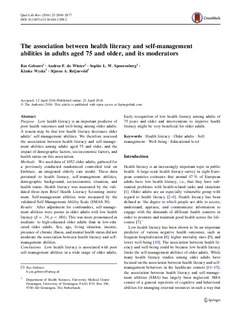The association between health literacy and self-management abilities in adults aged 75 and older, and its moderators
Journal article

Åpne
Permanent lenke
http://hdl.handle.net/11250/2477947Utgivelsesdato
2016Metadata
Vis full innførselSamlinger
Originalversjon
Geboers, B., Winter, A., Spoorenberg, S., Wynia, K. & Reijneveld, S. (2016) The association between health literacy and self-management abilities in adults aged 75 and older, and its moderators. An International Journal of Quality of Life Aspects of Treatment, Care and Rehabilitation - Official Journal of the International Society of Quality of Life Research, 25(11), 2869-2877. 10.1007/s11136-016-1298-2Sammendrag
Purpose: Low health literacy is an important predictor of poor health outcomes and well-being among older adults. A reason may be that low health literacy decreases older adults' self-management abilities. We therefore assessed the association between health literacy and self-management abilities among adults aged 75 and older, and the impact of demographic factors, socioeconomic factors, and health status on this association. Methods: We used data of 1052 older adults, gathered for a previously conducted randomized controlled trial on Embrace, an integrated elderly care model. These data pertained to health literacy, self-managementabilities, demographic background, socioeconomic situation, and health status. Health literacy was measured by the validated three-item Brief Health Literacy Screening instrument. Self-management abilities were measured by the validated Self-Management Ability Scale (SMAS-30). Results: After adjustment for confounders, self-management abilities were poorer in older adults with low health literacy ([beta] = .34, p < .001). This was more pronounced in medium- to high-educated older adults than in low-educated older adults. Sex, age, living situation, income, presence of chronic illness, and mental health status did not moderate the association between health literacy and self-management abilities. Conclusions: Low health literacy is associated with poor self-management abilities in a wide range of older adults. Early recognition of low health literacy among adults of 75 years and older and interventions to improve health literacy might be very beneficial for older adults.
